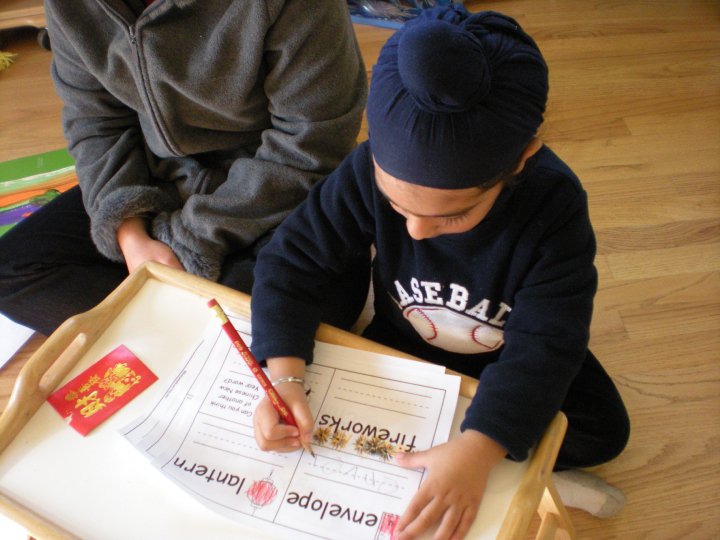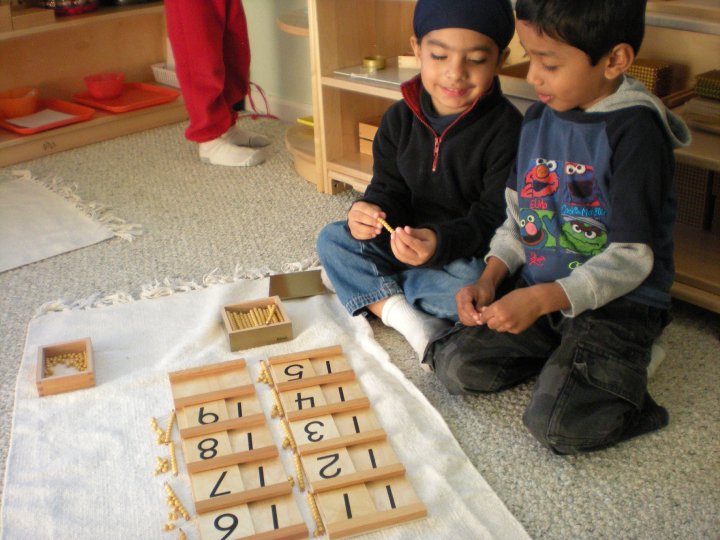Philosophy of Teaching

A teacher is showing a child a job — a simple “task that teaches” — for the first time, while nearby another child is working on a job by herself. These are familiar sights in classrooms organized using the Montessori method in which children learn abstract thought through “hands-on” experiences.
“Jobs”
Active Learning for Daily Life
Sensorial Skills
Language
Math
Art and Culture
“The child’s mind (draws) off from material objects their intangible essences, thus building up a store of abstract ideas. . . .”
-(Maria Montessori, Her Life and Work.) Tweet
Maria Montessori discovered that children, especially preschoolers, learn through their five senses. She developed individual jobs to promote active learning for daily life, sensorial skills, language, math, art and culture. An example of a daily life job is a small frame that has a shirt with buttons on which a child can practice buttoning and un-buttoning. An example of a job promoting the sense of sight is the “Pink Tower,” in which children arrange the cubes one on top of each other, learning the cubes are different sizes.
A Montessori curriculum plan is designed to help children explore and acquire key concepts and tools of inquiry for various disciplines in ways that are comprehensible and accessible for their age. Montessori’s materials, in fact, are specifically designed for the child. For example, the color of the “Red Rods” job attracts the preschooler, while also teaching the child the concept of length.This is an example of a key concept that is developed in children. This type of abstract thought is important for proficiency in geometry and math.
Children also have opportunities throughout the day to develop fine motor skills throughout the Montessori classroom. For example, the “Sandpaper Letters” job encourages children to use the first and second fingers of their hands to trace each letter, practicing their fine motor writing skills while at the same time learning the sounds of each letter of the alphabet.
Observation, checklists and anecdotal recording are some of the evaluative tools that Montessori teachers utilize to assess each child. The Montessori teacher is observing the child on a daily basis to assess the child’s learning and academic progress. As a Montessori teacher, it is important to be able to encourage children to be independent; the discipline of daily observation is crucial in order to support the child’s independence and learning and to discern what jobs should be introduced to the child to promote additional learning. For instance, a child who needed assistance daily in unbuttoning her coat could be shown the shirt-buttoning job both to promote her independence and to improve her fine motor skills.
The Montessori method best suits our teaching philosophy because we have seen evidence that children do very well when taught with this method. They are encouraged to start and finish jobs, they are taught to be independent and self-pacing, and the jobs they complete encourage the type of abstract thought necessary to be successful in school.
In addition to teaching through the “Montessori Method,” we have learned other skills to support each child in developing the skills necessary to be successful in Kindergarten and elementary school. For example, we know that aiding each child in learning all the sounds of the alphabet, identifying all the letters of the alphabet, identifying numbers up to 20, knowing the letters in one’s name, and learning social graces are skills that make it easier to be successful in later school. We also understand the balance needed to make sure a child is enjoying learning while in the preschool environment, because the preschool experience will set the stage for attitudes toward elementary school.
As well as helping children learn, our teachers are also interested in learning more themselves; we are always looking for ways to expand our professional skills and keep them up-to-date through continuing education, certifications, and collaboration with other educational professionals. We hope that our passion for learning will serve as a model for your child.

